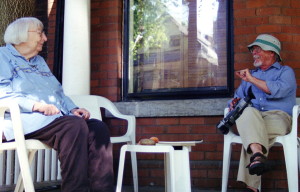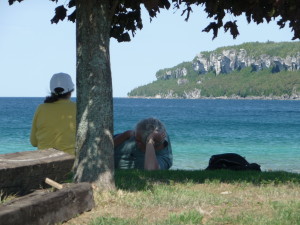
Jane Jacobs and Don Alexander on Jane’s porch. I made an educational video (Jane Jacobs Urban Wisdom, 40 minutes) with selected interview footage I shot over a ten year period.
JANE JACOBS: URBAN WISDOM
Below is a transcription Jane Jacobs’ description of her books, writing and research style, as recorded in the educational video “Jane Jacobs: Urban Wisdom” copyright 2002, Don Alexander and Jane Jacobs.
The Educational Video, Jane Jacobs Urban Wisdom (40 minutes) is available at
Introduction
(Jane Jacobs speaks)
Well, I had this idea that the way to find out how cities really should be planned and organized would be to look and see how they worked successfully. Well, how do you find that out? You do it by going directly to the subject matter, to the cities.
And the streets, I thought, were the most important thing in the city. How the streets looked, and how they worked. And I found that what I saw was very complicated. People weren’t just walking around in the city, or riding around in the city with nothing on their minds but where they were going. No, they were doing all kinds of things by the way. They were affecting the safety of the city. They were promoting their causes. The more you watched, the more interesting and amazing connections you saw.
(Narrator Introduction over Programme Title: Jane Jacobs Urban Wisdom)
Jane Jacobs’ writing career spans more than 60 years. Using what she calls a web-way of thinking, her writing and her ideas have influenced our cities and our understanding of economies.
The Death and Life of Great American Cities
(Jane Jacobs speaks)
My first book, The Death and Life of Great American Cities, I was pretty outraged at what city planners, and designers, and architects, and the politicians, and the developers who supported all these ideas were doing. I thought they were killing cities. They were very rigid. Regimentations– residents should be separated from working places, services and retail things that the population depended upon should be condensed into shopping malls. It was all boring, repetitious, and, as far as I could see, it didn’t work.
So I thought, cities have been around a long time. They have worked reasonably well. And, especially, you can find areas of cities that do work well, socially and economically. That’s what needs to be studied. That’s what needs to be observed. And see what’s important– what do you want out of housing? Or what you want out of shopping? Continue reading →


